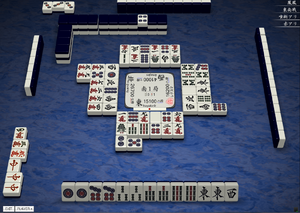Jigoku: Difference between revisions
Jump to navigation
Jump to search
No edit summary |
No edit summary |
||
| Line 5: | Line 5: | ||
|type = 1 | |type = 1 | ||
|available = 1 | |available = 1 | ||
|tilePattern | |tilePattern = {{#mjt:3z}} | ||
|gameExample = * [http://tenhou.net/0/?log=2014081309gm-0009-7447-f89229d5&tw=1 Hell wait] | |gameExample = * [http://tenhou.net/0/?log=2014081309gm-0009-7447-f89229d5&tw=1 Hell wait] | ||
* [http://tenhou.net/0/?log=2016101017gm-0009-7447-2cea2ddc&tw=0 With ippatsu] | * [http://tenhou.net/0/?log=2016101017gm-0009-7447-2cea2ddc&tw=0 With ippatsu] | ||
Revision as of 09:24, 25 March 2017
| Kanji | 地獄 |
|---|---|
| English | Hell wait |
| Fu | 2 fu |
| Tile types waiting | 1 sided wait |
| Tiles available | 1 tile |
| Pattern example |
|
| Tenhou.net example |
Jigoku 「地獄」 is a special case of tanki wait where two of the winning tiles are already visible to all the players.
Wait strength
Aside from karaten, this is the weakest choice for a wait, because of the number of available tiles to win: one. However, the solitary tile may actually be strong, as players may view it as a safe tile; and therefore, one player may discard it. The wait would be better still with the addition of suji and/or kabe, or even with an honor tile with two already discarded. In essence, choosing this wait may come in the form of a trap, luring unsuspecting players. This wait is best used for emergency situations, such as being in last place at oorasu and other dire circumstances.
External links

| ||||||||||||||||||||||
